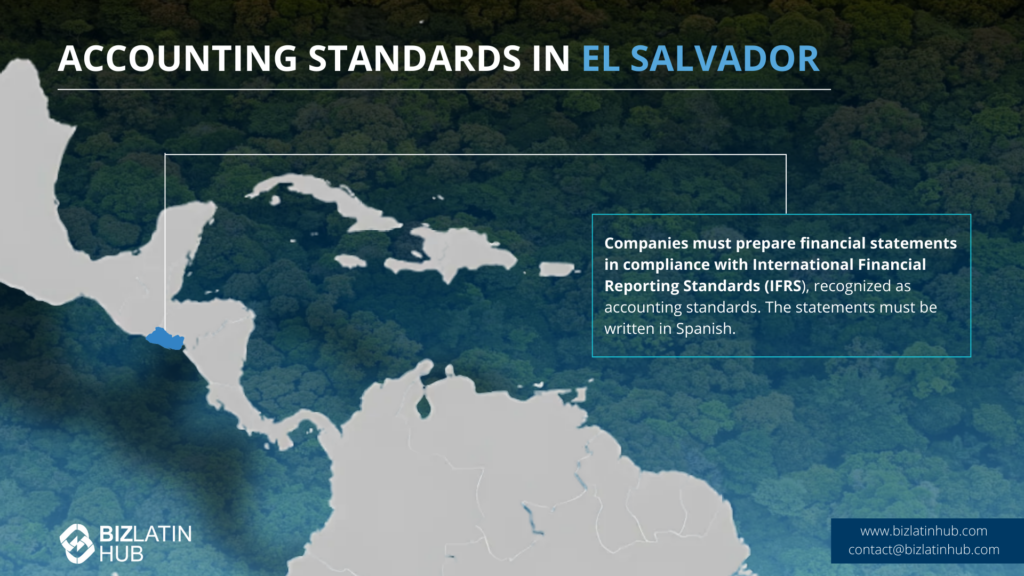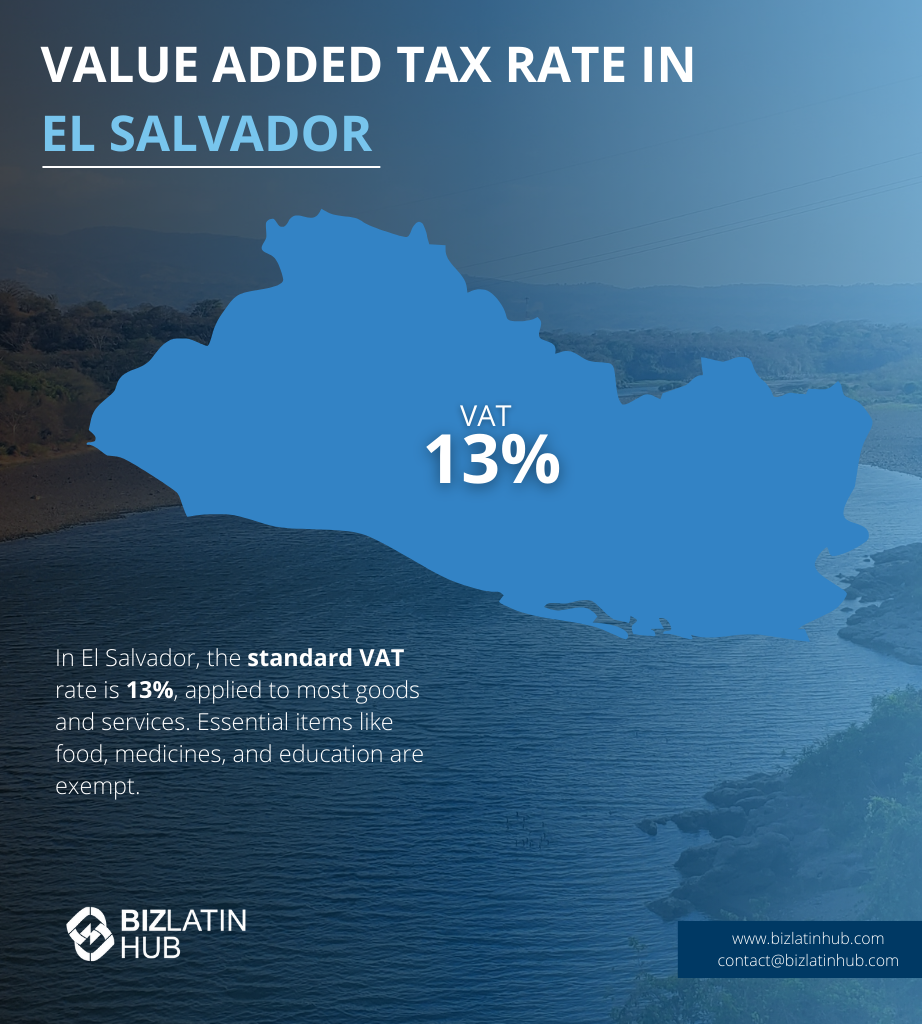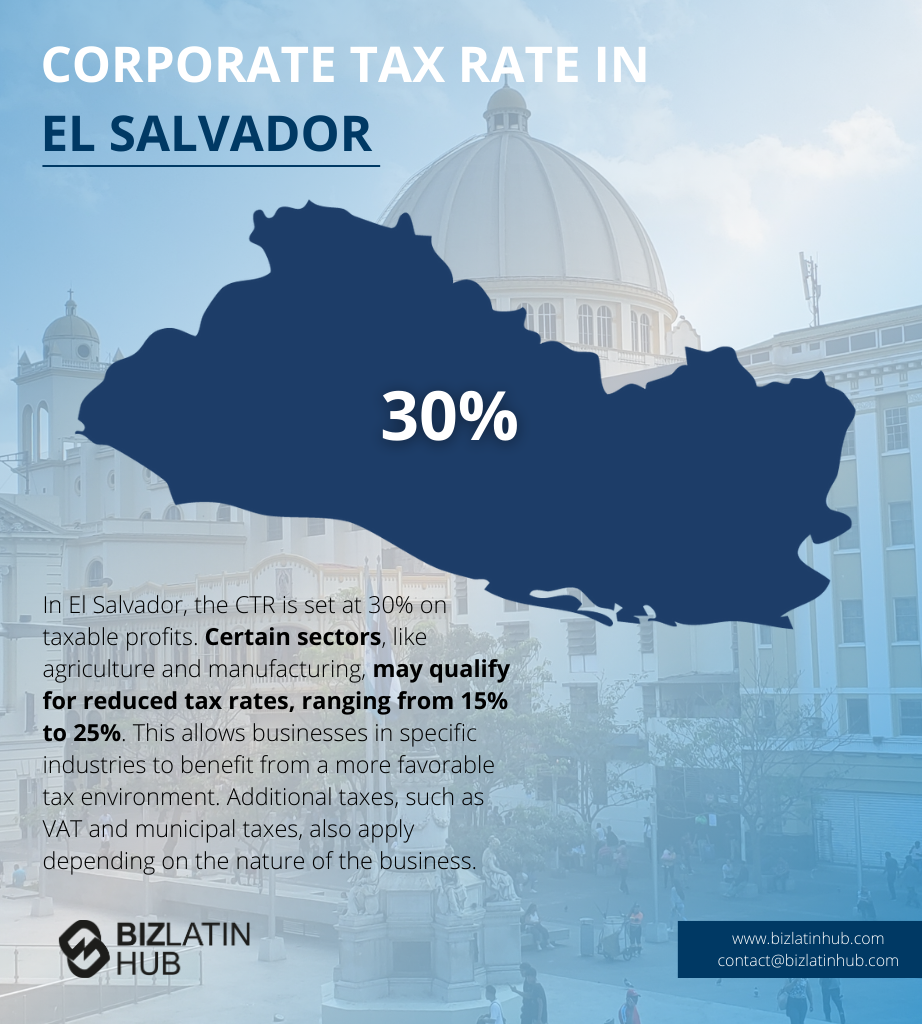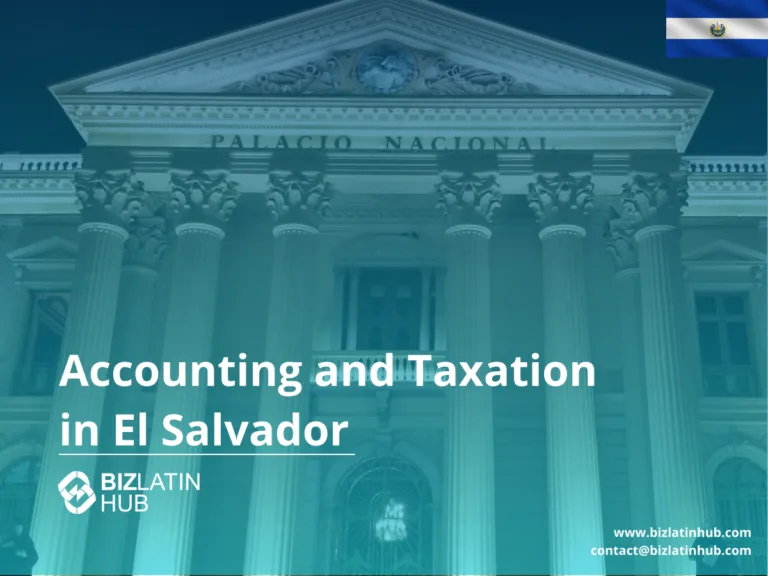Taxation and accounting in El Salvador is a core element of any market entry strategy, helping to ensure when you incorprate a company in El Salvador it reamins compliant with the country’s regulatory framework. This guide delivers key insights to efficiently manage El Salvador’s fiscal obligations managed by the relevant authorities. DGII manages tax reporting, ISSS oversees health/social contributions and AFPs (Pension Administrators) manage retirement accounts.
Key Takeaways On Taxation and accounting in El Salvador
| What Are The Accounting Standards in El Salvador? | Companies must prepare financial statements in compliance with International Financial Reporting Standards (IFRS), recognized as accounting standards. The statements must be written in Spanish. |
| What Is The Corporate Tax Rate in El Salvador? | A rate of 30% is collected. |
| What Is The El Salvadorian Value Added Tax Rate? | The VAT (IVA) rate in El Salvador is set at 13%. |
| Dividend Tax Rate in El Salvador | Cash porfits and dividends are subject to a 5% withholding tax (Increases to 25% if paid to a tax haven considered by the government). |
Overview of El Salvador’s Accounting and Tax System
Accounting requirements are crucial to the incorporation process of a company in any country, and El Salvador is no different. Normally, it is best to employ an authorized public accountant who is responsible for all company accounts. Some of the primary accounting administrative tasks to consider are:
- Management of Auditing: This includes keeping documentation of all the different corporate transactions that flow through the company.
- Tax Management: You must ensure that all operations of the company are properly filed and all tax payments are completed on time.
- Fiscal Auditing: You must verify that your company’s activity verifies with tributary requirements. Depending on the size and income of the company, you may need to hire a fiscal auditor.
- IFRS: All accounting registers and requirements must be submitted by the IFRS (International Financial Reporting Standards)
The above requirements apply to nearly every type of society in El Salvador, except for a few cases whereby some regulations may be added or removed. A local agent can help you understand if you qualify for exemptions.
How do taxes work in El Salvador?
The above-mentioned tax requirements apply to nearly every corporation operating in El Salvador. However, the following information may only apply to some investors:
- Shareholders or Partners of the company must be registered with the treasury as individuals and obtain their Tax ID (NIT.)
- Sharing Company Capital: When you set up a company, you must declare how the company’s total capital is divided. This includes the number and value of shares each partner or shareholder has. You do this when you register the company with the Treasury. Remember, if there’s a change in shareholders or the value of the shares changes, you need to update this information with the Treasury.
- Real Estate Transfer Tax: Buying or selling property? If the property is worth more than $28,571.43, a 3% tax applies to the transaction.
- Bank Transaction Tax: For some financial operations, like certain bank transactions over $1000, there’s a small tax of 0.25%. The bank will handle this tax, but it does not apply to all transactions, and many are exempt from this tax.
- Income Tax on Salaries (Tiered System): In El Salvador, income tax for employees is calculated using a tiered or bracket system. This means the amount of tax an employer needs to withhold from an employee’s salary depends on how much they earn. Employees with higher net monthly incomes are taxed at a higher rate. For those earning a net monthly salary of $500 or more, the tax rate varies between 10% and 30%. Essentially, the more an employee earns, the higher the percentage of their salary will be withheld for income tax. This system is designed to ensure a fairer distribution of tax responsibilities, where those with higher incomes contribute more in taxes.
- Importation Tax: Planning to import goods into El Salvador? There’s an import tax ranging from 5% to 40%, depending on what you’re importing.
Although the El Salvador legal system allows a company legal representative to carry out legal, accounting, and administrative responsibility in addition to their legal role, we advise that you employ two people to carry out the separate roles as it can prove to be a very cumbersome and stressful role for just one legal representative, and they may lack the necessary expertise.
Corporate Tax, VAT, and Withholding Obligations
Operating a business in El Salvador requires diligent tax management. You will have to pay online using F-07 and F-930 forms for submissions via DGII platform.The type of taxes your business will encounter depends on its legal structure and the nature of its activities. Here’s an overview of the primary taxes applicable to businesses in El Salvador:
- Value Added Tax (VAT): This is a 13% tax on the purchase of goods and services.
- Corporate Income Tax: Companies are taxed on earnings from 25% to 30%.
- Tax on Dividends: Profits distributed as dividends are subject to a 10% tax.
- Tax for Limited Liability Companies (LLCs): LLCs face a tax rate that varies between 25% and 35%.
- Tax Rate for Branch Offices: Branches of foreign companies operating in El Salvador are taxed at 25% to 30%.

DON’T FORGET: Companies must register before the Treasury Department to receive their Tributary ID Number (NIT) and its Unique Registration and Contributor Number (NRC).
Recent Legal Changes

- Private-public partnerships
- Tax reforms and transfer pricing regulations
- Incentives for the technology sector
- Tax incentives
- Simplified regulatory approvals
- Intellectual property rights protection
El Salvador has been actively working to improve its business environment, particularly by introducing regulatory reforms that enhance the ease of doing business. These efforts have focused on several key areas:
Public-private partnerships: The legal framework governing public-private partnerships was overhauled, making the country more inviting for foreign investors. This change aims at fostering collaboration between the government and private entities, thereby accelerating economic growth and infrastructure development.
Tax reforms and transfer pricing regulations: The government has implemented tax reforms, including new rules around transfer pricing. These reforms should create a more transparent and efficient tax environment, making it easier for businesses to comply with tax regulations and plan their investments.
Incentives for the technology sector: Recognizing the critical role of technology in economic advancement, El Salvador has introduced legal changes to attract tech-based businesses. These incentives include:
Tax incentives: Tech companies in El Salvador may benefit from various tax incentives. These can include reductions in income tax, exemptions from import duties on technological equipment, and tax credits for research and development (R&D) expenditures.
Simplified regulatory approvals: For technology-based startups, the government is streamlining the process for obtaining business licenses and approvals. This initiative aims to reduce bureaucratic hurdles, making it faster and easier for new tech companies to establish and grow.
Intellectual property rights protection: Enhancements in intellectual property laws provide better protection for tech companies’ innovations. This creates a more secure environment for investment and encourages the development of new technologies.
In El Salvador, employers are required to make social security contributions on behalf of their employees. These contributions go toward health care, pensions, and other social welfare benefits. The rates and specific requirements can differ depending on factors like the sector and size of the company.
For legal compliance and cost planning, this is a crucial factor. Employers should assume around 7.5% for ISSS (healthcare), AFPs (pension) and FSV (housing). This must be reported monthly to DGII via digital planillas.
DTE Electronic Invoicing and DGII Filings
Digitalization is accelerating globally, and El Salvador is no exception. E-commerce is on the rise, and there are regulatory considerations for online businesses. These may include data protection laws, electronic transaction regulations, and consumer rights applicable to online shopping.
DTE issuance is mandatory via DGII-certified systems. These must be in an XML format and have both a digital stamp and real-time validation. This applies to all commercial activity. VAT must be declared monthly by the 10th and payroll is also monthly. ISR must be declared no later than March 31 of the following year.
Anti-corruption Measures
Addressing corruption is a critical aspect of business operations, particularly in emerging markets like El Salvador. To combat this, El Salvador has implemented stringent anti-corruption laws that businesses must comply with. The key elements of these measures include:
- Strict Anti-Corruption Laws: El Salvadorean businesses must adhere to national anti-corruption regulations. Failure to comply with these laws can lead to severe consequences, including substantial fines and possible imprisonment for those in violation.
- Mandatory Corporate Compliance Programs: Companies are required to establish comprehensive compliance programs. These programs ensure that all business operations are conducted by legal and ethical standards. They play a crucial role in preventing corrupt practices within organizations.
- Internal Audits: Regular internal audits are a necessity for businesses in El Salvador. These audits help identify any potential areas of non-compliance or unethical conduct within the company. They are a proactive measure to safeguard against corrupt activities and ensure adherence to internal policies and external legal requirements.
- Transparency Measures: Transparency in business operations is not just encouraged but mandated. This includes clear documentation of transactions, open communication channels, and accountability in decision-making processes. Such transparency is vital for maintaining integrity and trust, and it helps detect and prevent corruption.

FAQs About Tax and Accounting in El Salvador
Based on our extensive experience, these are our clients’ common questions and doubts when looking to understand accounting and taxation in El Salvador.
The standard rate is 30%. Companies with annual income under USD$150K may qualify for reduced compliance requirements.
Businesses in El Salvador are taxed primarily through corporate income tax and Value Added Tax (VAT). The corporate income tax is levied on their taxable income, which is determined by subtracting allowable deductions from total revenue. The current corporate tax rate is 30%.
– Value Added Tax (VAT) on goods and services sales is currently 13%. Businesses are required to collect VAT from their customers and remit it to the government. Input VAT (VAT paid on business expenses) can be credited against output VAT (VAT collected from customers).
– Income Tax Withholdings: Businesses are also responsible for withholding income tax on certain payments, such as salaries, professional fees, and payments to foreign entities. These withheld amounts must be remitted to the tax authorities.
– Pago a Cuenta: This is a provisional monthly payment that businesses have to make, based on a percentage of their gross income. It serves as an advance payment of the annual income tax liability. These payments are later credited against the total tax liability for the year.
The equivalent to the IRS in El Salvador is the Ministerio de Hacienda, specifically the Dirección General de Impuestos Internos (DGII) or in English, the General Directorate of Internal Taxes. It is responsible for tax collection and implementing tax policy in El Salvador.
In El Salvador, companies must prepare their financial statements according to International Financial Reporting Standards (IFRS), which are accepted as accounting standards. Spanish should be used to prepare the financial statements.
The equivalent of a Certified Public Accountant (CPA) in El Salvador is a Contador Público Autorizado (CPA), certified by the Consejo de Vigilancia de la Profesión de Contaduría Pública (CVCPC) or the Oversight Council for the Public Accounting Profession.
Yes, El Salvador has adopted IFRS as its accounting standard. Companies, including financial institutions and insurance companies, are required to prepare their financial statements according to IFRS.
VAT (IVA) is 13%, filed monthly with the Dirección General de Impuestos Internos (DGII).
Yes. Employers must register employees with the ISSS and AFPs, contributing approximately 7.5%.
Yes. As of 2023, DTE (Documentos Tributarios Electrónicos) is required for all registered taxpayers.
Why Invest in El Salvador?
El Salvador is not a country to overlook as a business jurisdiction. A country of just 6.5 million people has a positive business relationship with the United States, hosting giant companies such as FedEx and General Motors. The two countries have an impressive exchange of nearly USD$6 billion in goods, meaning accounting in El Salvador needs to be on point.
It is also an easy destination to conduct business, facilitated by a dollarized economy and a growing and thriving service-based industry. This article will walk you through the different types of accounting in El Salvador and the tax declaration obligations facing you there.
Biz Latin Hub can Help You With Taxation and Accounting Requirements in El Salvador
El Salvador offers many attractive benefits for those looking to establish business operations in the region. Taking the time to understand the local tax and accounting requirements and ensuring that you have a solid support network of legal and accounting staff can be crucial to the success of your business.
Biz Latin Hub is the market leader in helping local and foreign companies to successfully expand their business in El Salvador by providing a full suite of multi-lingual commercial representation and back-office services.
To learn more about the El Salvadoran economy and the business opportunities to form a company in El Salvador, please contact us today.






